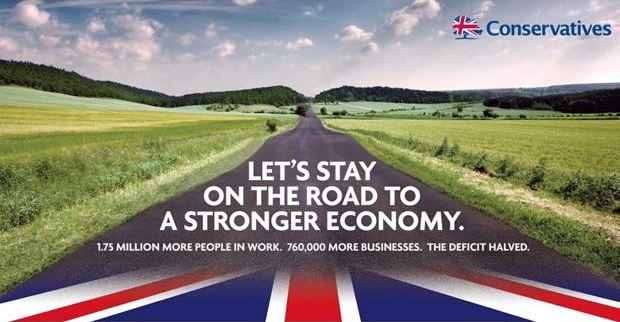When you look inside political parties you discover they are pretty empty

 “Party strategists must be scratching their heads […] after the latest debacle” writes David Shariatmadari in The Guardian, examining the story of the British Conservative Party using a Photoshopped picture of a road near Weimar, Thüringen, Germany to illustrate their latest election poster. Shariatmadari’s piece goes on to list the long line of campaign poster mishaps, from actors employed to play the unemployed, to the MyDavidCameron series of parodies. Cameron even decided to not put his own picture on the posters as a result of the 2010 MyDavidCameron experience, says The Daily Mail. Steve Bell’s cartoon about the debacle is here.
“Party strategists must be scratching their heads […] after the latest debacle” writes David Shariatmadari in The Guardian, examining the story of the British Conservative Party using a Photoshopped picture of a road near Weimar, Thüringen, Germany to illustrate their latest election poster. Shariatmadari’s piece goes on to list the long line of campaign poster mishaps, from actors employed to play the unemployed, to the MyDavidCameron series of parodies. Cameron even decided to not put his own picture on the posters as a result of the 2010 MyDavidCameron experience, says The Daily Mail. Steve Bell’s cartoon about the debacle is here.
While The Guardian piece correctly explains the problem – that getting election posters right is a hard task – the reason for the problem is, I think, a different one, namely that these mythical ‘strategists’ are actually not very good, and that they are living in a bygone era, and the way the press reports all of this contributes to this false impression.
First, the internet has changed the defaults. A political party cannot assume it can get away with anything any more – any image will be analysed, the origin of the people in a photo established. The solution here would be to be transparent from the start, producing a small dossier of information about every poster, explaining where and when the photos were taken. And if there is no suitable road for your image, then get out a camera and go and take a picture of one.
Putting this another way, using a picture of a road near Weimar is foolish, but assuming that no-one would find out about it is ever more stupid.
The second, and more profound, problem is that the way that political parties work, and the way that the newspapers report on them remains largely unchanged – these ‘strategists’ cook up programmes and slogans and campaigns, largely in secret, and then set out to deliver them. Yet if the campaign is cooked up in secret, and has no real connection to either the grassroots of the party, or voters’ actual needs, the danger of making a mis-step is high. Parties can try to mobilise their own people on social media (a “digital firepower onslaught” as the FT calls it) but this leaves the campaigns in general rather flat and bland, and the online activity akin to backing a football team rather than participating in a political process. I, like Charlie Beckett, am dreading the next 5 months. Geoff Mulgan thinks 2015 will be the year online politics will make a breakthrough in British political parties, but I remain to be convinced.
The third factor is the backdrop of British politics at the moment. Both Labour and The Conservatives are stuck with the mindset that with one further push they will, once more, be able to command majorities in the House of Commons (underlined by this on Twitter from Puffles). This is of course thanks to the First Past the Post (FPTP) election system for Westminster, because at every other level British politics is already a classical European multi-party system. The problem however for the two large parties is that FPTP forces those parties to be as broad as possible in their appeal, but this comes with the price of the disconnection between party leadership (and its ‘strategists’) and the grassroots of the party, and those grassroots then become restless and many of them leave – remember that the UK has the third lowest party membership in the EU. This evisceration of the parties – both Labour and the Tories have just 10% of the membership today that they did at their peaks in the 1960s – means parties are administratively weak, contributing further to the first and second points above – even finding good strategists is hard.
For the eighteen years I’ve been deeply involved with party politics I’ve been wondering when I will be wowed by the genius of someone’s political strategy, but it has not happened yet. When you look deeply into political parties – at least in the UK – you realise they are pretty empty. We are going to see plenty more evidence of it between now and the May general election.
“Putting this another way, using a picture of a road near Weimar is foolish,”
Yes and no. Depicting it as a road to a stronger economy is not THAT wrong, even though there may be not an actual road connection. I’m just not sure that the Tories wanted to imply people looking for a stronger economy should emigrate to Germany. Especially their back-benchers’ notion of a Brexit might make that a wee bit more difficult 😉